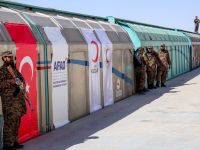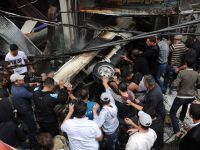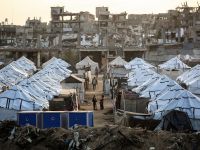The Ghanaian opposition, disappointed and angry over a Supreme Court ruling that it fears will allow the ruling National Democratic Congress (NDC) to steal this week's elections, was preparing its response Tuesday.
"The situation is very unfortunate," Dan Botwe, general secretary of the main opposition New Patriotic Party (NPP), told AFP. "It's going to delay the (voting) procedure. It's going to create confusion."
An urgent press conference has been called for later in the day by five of the six opposition parties fielding candidates in Thursday's elections that will herald the end of Jerry Rawlings' 19-year rule.
The opposition charges that the NDC will use the ruling -- handed down by Ghana's Supreme Court late Monday -- to rig the vote.
The ruling allows registered voters to present old identification cards bearing only thumbprints at polling stations in addition to newly issued photo IDs.
The photo IDs were provided under a two million dollar program funded mainly by Denmark, Britain and the European Union that paid the costs of producing the laminated cards and transparent ballot boxes.
The program also supports seven local non-governmental organizations that will be monitoring the presidential and parliamentary elections.
In the final days of campaigning, which officially ends Tuesday, the NPP has come out loudly against the possible admission of thumbprint IDs, with the rallying cry of "No picture, No vote."
The polling procedure includes striking the voter's name off the electoral list, and encircling a thumbnail with indelible ink after the vote is cast.
The scenario feared by the opposition is that NDC operatives armed with discarded thumbprint IDs will go early to polling stations and vote in place of legitimate voters with photo IDs.
Perhaps more ominously, the opposition alleges that soldiers have been intimidating villagers in rural areas, the traditional support base of President Rawlings which has been crumbling in view of the charismatic leader's imminent departure.
In addition, the opposition charges that Rawlings himself is trying to incite the army against the opposition.
"President Rawlings is the father of the nation. He is supposed to be neutral," said Aliu Yussif Issa, chairman of the small People's National Convention, at a press conference Tuesday. "It's unethical. He is inciting them against the opposition parties."
Rawlings, who was Ghana's military ruler for 11 years before winning democratic elections in 1992, is "embarking on a dangerous path," Issa said.
RS Ampongsan, the chairman of the NPP council of elders, said Rawlings "himself must realize that he is doing a disservice to the country."
If the parliamentary and presidential elections do bring about an orderly transfer of power in free and fair conditions, the event will be a first in African history.
No former military ruler on the continent who has legitimized his power through elections has willingly stepped aside at the expiration of a democratic mandate.
The outgoing president's chosen successor, incumbent Vice President John Mills, is facing a stiff challenge from the NPP's John Kufuor, who lost to Rawlings by just 488,000 votes in 1996 -- ACCRA (AFP)
© 2000 Al Bawaba (www.albawaba.com)







